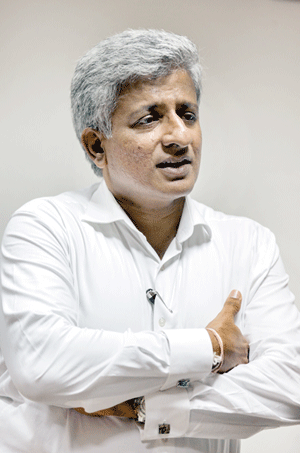Nishantha blames ExCo interference for Cricket crisis
View(s):
Pic by Sameera Weerasekara
At the same time, he felt the prevailing situation in cicket gives him more than one reason to break his self-imposed silence from the media heat. From this corner, what the ‘Musings’ wanted to know was, does he feel he too is responsible for the bottomless situation that prevails today, since it it was the administration which Ranatunga was part of, which fired the shots and had been the custodian of local cricket till the one-year Wettimuny Interim administration was installed:
Answering to that pose, Ranatunga explained that, generally, people who lose an election, start berating the ones who have come on stage, from day-one. But, as a matter of fact, he did not believe in that norm and opted to stay out in the cold but, as things have begun to go awry in a big way, he is now ready to take up the Musings’ challenge.
“I see a great danger to Sri Lanka’s cricket future. Yes, I agree I had to handle things in a very stern manner. Most of the matters pertaining to the core of cricket went through me. For instance, media, players and officials have to go through this channel as per SLC’s constitution. During that time, we did quite well in cricket. We got into four cricket cup finals — one in England, then two in Sri Lanka and one in Bangladesh. We won in Bangladesh while in the other three we were runners-up. At the same time, we were second in the Test rankings, in the ODIs we were No.2 and No.1 in T-20 Cricket.
“During that time there were a lot of inputs from many people, to do the right thing for the game. Now, a lot of things are getting out of hand. I think people should be strong enough to do the right thing. Then we must focus on as to what we need in terms of the game. It is important that you understand cricket in its technical and physical aspects. Then we have to understand the game in terms of bringing in revenue, doing the commercial activities, bringing in revenue and communication skills.”
Ranatunga explained they were successful in accomplishing those aspects of the game. He said some are complaining about the building of the stadiums but, in reality they are assets for the SLC. “Yet, getting back to the present context, I feel there is a lot that is going wrong. Firstly, there is no plan for the game.”
Ranatunga reiterated that Sri Lanka cricket’s strongest point is its Club Cricket structure. He feels that a strong Club Cricket tournament is essential but, for the past 8-9 months we have not played any Club cricket.
But, the Sunday Musings pointed out to the former SLC Secretary that most of the former cricketers and personalities of repute are of the view that, if Sri Lanka is to move forward in cricket, we must have a system that is based upon Provincial Cricket, which is the only way out. Ranatunga said, “It is important to have 70-80 players to arrive at the first 20 national cricketers. It could be Provincial Cricket. It could be Club Cricket or, any other tournament you may wish to call it. As a matter of fact, we don’t have to follow the other systems. For instance, Australia is a large country and some of the states themselves are much bigger than Sri Lanka. So, obviously, their system is implemented on a bigger scale but, we are a small country, we have to base our cricket on our strengths.
“We need to develop the District and Provincial structure with a long-term plan. We need to have a good Under (U)-15, U-17 and U-19 domestic structure. It is to focus on talent scouting. Then, based upon that, we can build our national pools.”
The former SSC and Colts cricketer pointed out that till Sri Lanka’s economy revolves round Colombo and its environs, once cricketers finish their education, they have to head towards Colombo, either for employment or for higher studies. “So, this has to be done with a 10-year plan. Because the Provincial structure must have good coaches, good practice facilities, and a good technical and administrative structure to run Cricket. For instance, just look at SSC or, the Tamil Union or, NCC, they are pretty well equipped with all those facilities, because they have the finances. As a matter of fact, entitites of that magnitude should have all those ingredients in their provincial soup. My view is that we should develop the Provincial system in a planned manner, may be a 10-12-year plan, where we could develop provincial centres. That is the long term plan. But, to exist in cricket, we need a short-term plan and that is the Club Cricket system. I know the talent comes from out and we have to develop it and, at the same time, the Colombo kids have varied interests which exactly do not go hand in hand with the cricket ideology. Still for all, Provincial system should be done in a more systematic manner.
“At the same time, we are much disturbed with the selection process too. We reliably understand that Chief Selector Sanath Jayasuriya tried to resign from that position on more than one occasion. This is because there is interference from the executive committee. You cannot let the executive committee interfere in these matters. I have noticed that more than 40 players were run through the mill during the past 18 months. Forty eight players representing the country in 18 months is not acceptable. During our time we had 15-18 who were focusing on various disciplines and fighting for a place. Get into the national side through political interference or club politics cannot be condoned. Even during our time various executive committee members tried to interfere, but we were very firm. We only allowed the selection committee and coaching staff to get involved in such matters. We used to select the squads about one to one-and-a-half months prior to a tournament or tour,” Ranatunga said.
The Sunday Musings then pointed out: Nevertheless you had many-a-difference with certain players, though you did not bring them on to the playing field.
 Ranatunga explained, “There are certain times that, as administrators, we have to take decisions that are not popular. Most of this involves finances. To run the Board effectively, we need finances. For instance, a practice ball costs around Rs 10,000. For a week we use minimum six balls or about 36 balls a month. This costs us about Rs. 300,000-400,000. On top of that, we were allocating about 70 percent of our revenue to a certain group of players, and we did not agree to that. We tried to explain matters to them and tried to make them understand, but at the same time, it is human ‘when you have something you do not want to lose a part of it’. That is management, as players they could always come out and communicate their views. They can go hard on us but, it was our duty to absorb it. My job was to do the right thing by the game. We progressed in the game to this level because of their contribution.”
Ranatunga explained, “There are certain times that, as administrators, we have to take decisions that are not popular. Most of this involves finances. To run the Board effectively, we need finances. For instance, a practice ball costs around Rs 10,000. For a week we use minimum six balls or about 36 balls a month. This costs us about Rs. 300,000-400,000. On top of that, we were allocating about 70 percent of our revenue to a certain group of players, and we did not agree to that. We tried to explain matters to them and tried to make them understand, but at the same time, it is human ‘when you have something you do not want to lose a part of it’. That is management, as players they could always come out and communicate their views. They can go hard on us but, it was our duty to absorb it. My job was to do the right thing by the game. We progressed in the game to this level because of their contribution.”
Then we brought the topic back to the present situation and what should be done.
Ranatunga said, “The selectors should have the freedom to work with the coaching staff and complete those tasks. At the same time, even the selection process was more organised and there were checks and balances. For instance, if a wrong player is selected, it goes to the particular coach’s file and the head of coaching at that time, Jerome Jayaratne, used to analyse them. They knew that process and worked accordingly. But, now the whole process has deviated. They are promoting certain players who are playing for particular clubs. As result the clubs suffer. For instance, how many players left Bloomfield and joined the CCC, after the cricket elections? Bloomfield is a club that has been providing players, but due to political reasons most of the good players were taken away from that club. It happened even for some other clubs. I feel these are things that have to be stopped.”


